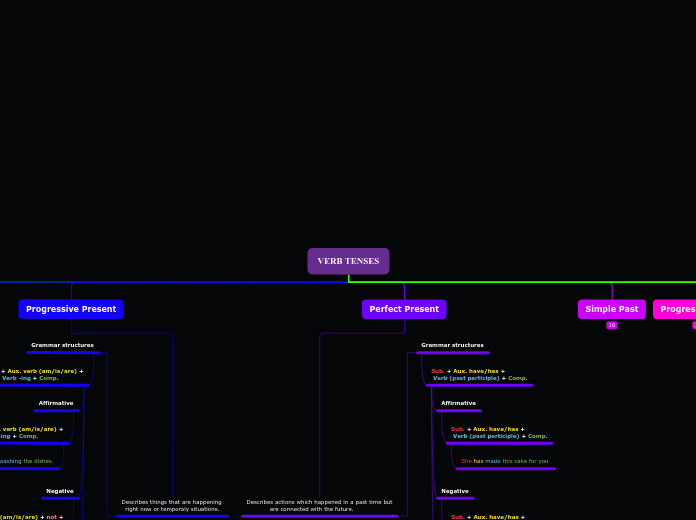przez Wilfredo Salas 5 lat temu
323
Organigrama

przez Wilfredo Salas 5 lat temu
323

Więcej takich
Aux. will + Sub. + have + Verb (past participle) + Comp. + ?
Will Mom have cooked our favorite meal?
Sub. + Aux. will not + have + Verb (past participle) + Comp.
Jenny will not have saved enough money yet.
Sub. + Aux. will + have + Verb (past participle) + Comp.
They will have left Japan.
Aux. will + Sub. + be + verb –ing + Comp. + ?
Will Carl be suffering every weekend?
Sub. + Aux. will not + be + verb –ing + Comp.
Ok, ok. I will not be bothering you this time.
Sub. + Aux. will + be + verb –ing + Comp.
Our team will be working hard for this project.
Aux. am/is/are + Sub. + going to + Verb + Comp. + ?
Are you going to go the cinema tomorrow?
Sub. + Aux. am/is/are + not + going to + Verb + Comp.
The teacher is not going to help me with English class.
Sub. + Aux. am/is/are + going to + Verb + Comp.
I am going to swim with my friends.
Auxiliary WILL + Subject + Verb + Complement + ?
Will you be alright...?
Subject + Auxiliary WILL NOT + Verb + Complement
No, Lucy will not sleep because the movie.
Subject + Auxiliary WILL + Verb + Complement
Santos will die tonight.
Aux. had + Sub. + Verb (past participle) + Comp. + ?
Had they studied all night long?
Sub. + Aux. had not + Verb (past participle) + Comp.
Valeria had not taken her school notebook.
Sub. + Aux. had + Verb (past participle) + Comp.
He had gone through this street.
Verb to be (past) + Sub. + Verb -ing + Comp. + ?
Was the girl falling in love with him?
Sub. + Verb to be (past) + not + Verb -ing + Comp.
Our team were looking for dates.
Sub.+ Verb to be (past) + Verb -ing + Comp.
Genesis was playing with my PC.
Were
We
They
You (singular/plural)
Was
It
He
She
I
Auxiliar verb (did) + Subject + Verb (simple present) + Complement + ?
Did you call Erika by her name?
Subject +Auxiliar verb (did not) + Verb (simple present) + Complement
She did not drive this stolen car
Subject + Verb (simple past) + Complement
None of these guys took a shower last week
Irregular
Don't end in -ed. Instead, have a different way to write.
Regular
End in -ed
Sub. + Aux. have/has + Verb (past participle) + Comp.
Aux. have/has + Sub. + Verb (past participle) + Comp. + ?
Have you fallen asleep?
Sub. + Aux. have/has + not + Verb (past participle) + Comp.
I have not watched this video, sorry.
She has made this cake for you.
Sub. + Aux. verb (am/is/are) + Verb -ing + Comp.
Aux. verb (am/is/are) + Sub. + Verb -ing + Comp + ?
Is my son doing his homework?
Sub. + Aux. verb (am/is/are) + not + Verb -ing + Comp.
Amelia and Maria are not looking for troubles.
John is washing the dishes.
Subject + Verb + Complement
Order
Main verb + Complement
Press the button.
Interrogative
Auxiliary do/does + Subject + Verb + Complement + ?
Do you think I am fool?
Negative
Subject + Auxiliary don't/doesn't + Verb + Complement
Maria doesn't have to do this job.
Affirmative
Smurfs are blue and that is cute.